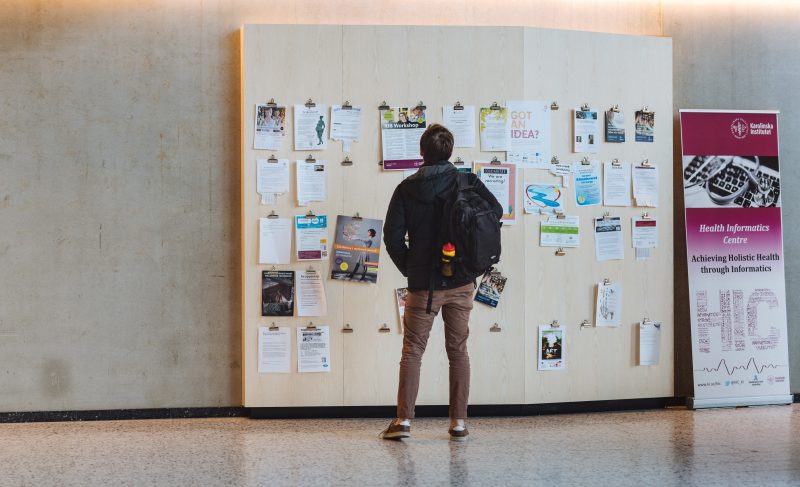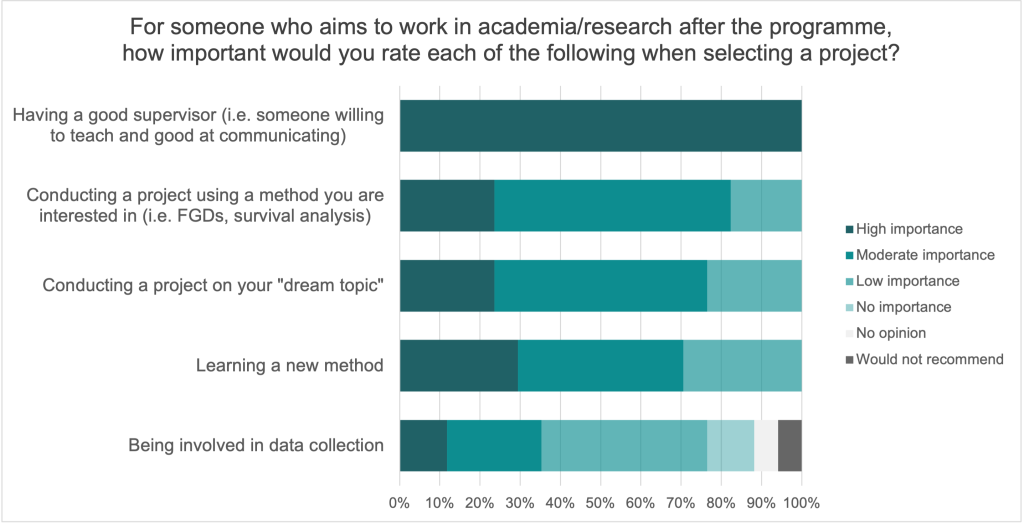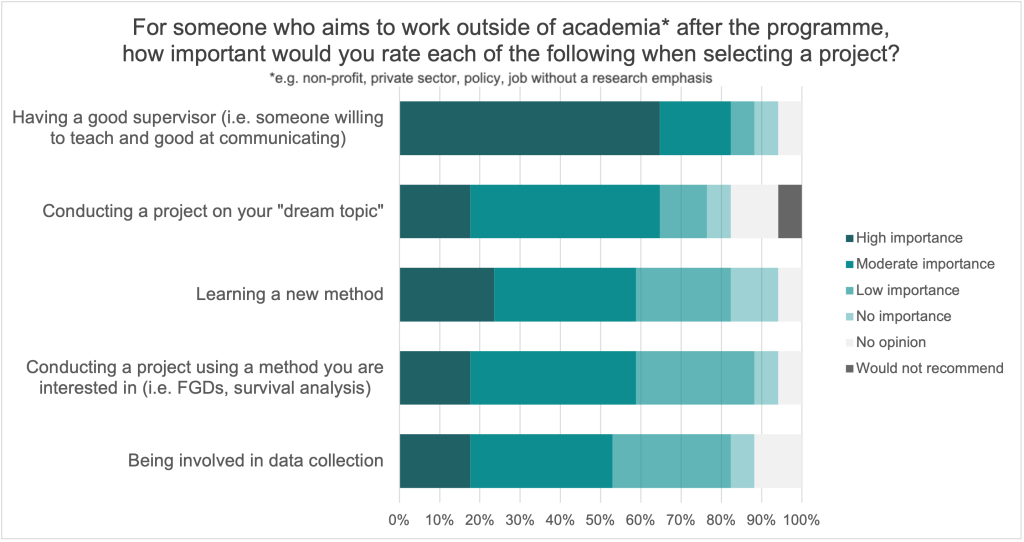
Top Thesis Tips from Recent Graduates
For many, the thesis is the culmination of the master’s programme and perhaps even of their entire education to date. The master’s thesis is not only an opportunity to demonstrate your skills and knowledge but a chance to dive into your topic of interest. Yet, with all of this potential and the countless topics you could write your thesis on, the thought of selecting your thesis project––let alone writing it––can be quite daunting.
Should you prioritise writing your thesis on your “dream topic”? How important is the supervisor really? And what impact may the thesis have on your future career?
In the search for thesis advice, I reached out to the recently graduated Public Health Sciences Class of 2020-2022. Seventeen alumni from the Epidemiology (Epi) and Health Promotion and Prevention (HPP) tracks provided invaluable insights and advice. I am sure many students will benefit from what they had to share as much as I did.
Prioritise the right things
While the thought of writing your thesis on your “dream topic” can certainly be exciting, the alumni indicated that this really should not be your No. 1 priority when selecting a topic.


Regardless of whether you want to remain in research/academia, you should prioritise having a thesis supervisor who is responsive and has time to guide you.
Your supervisor is the most important part of your thesis, they will make or break your thesis experience. A topic that you’re super interested in is nice, but remember that the thesis is only a couple of months and not everything is feasible within that time frame, so don’t dream too big. In the end, the thesis is just a course you need to pass, so don’t make it too hard on yourself.
Epi alum
If you can, spend time fostering the relationship you have with your supervisor (e.g., meet them for a coffee to learn more about their life & career, and offer up the same information. build a bond!)
HPP alum
Additionally, having a co-supervisor can enhance your thesis experience as your main supervisor may have very limited time.
Still, your overall goals will heavily influence why you choose a project. “Prioritize what you would like out of the program and thesis/supervisor after university (research/organization etc.) and skills you want to acquire”, advises an HPP alum.
Plan ahead if you want to conduct research abroad
The Master’s Programme in Public Health Sciences allows students to complete the thesis abroad. KI has several partner universities that allow students to collect data for their thesis project.
If you want to go abroad, an advice is to start connecting with the universities or professors you have in mind NOW*.
Epi alum *i.e. very beginning of the fall semester of your second year
If going abroad is too difficult, a compromise suggested by an HPP alum is to look into projects that collaborate with international organisations. Even if the research group is in Sweden but the project is set in, e.g. Uganda, these partnerships could help build a network with the organisation in the country of interest.
Think a bit outside of the box.
HPP alum
Discuss publishing your thesis
Publishing one’s thesis is a goal for many master’s students, especially if you’re hoping to work in research in the future.
If you’re planning on publishing your thesis, make clear arrangements with your supervisors about the goal of the publication before your thesis. Targetting your thesis to the future publication will save you a lot of time later when writing a manuscript. But also be prepared to change your analyses multiple times after your thesis.
Epi alum
Searching for projects “with potential” when looking for a thesis project is another good tip from an HPP alum. Larger projects may have more funding available, but there may be less freedom in selecting the research aim and methods.
While it is certainly helpful to discuss the possibility of publishing early on with your supervisor, some alumni cautioned that while writing your thesis, your focus should be on the thesis.
Relax about it for now, and don’t fall victim to the publishing pressure.
HPP alum

See your thesis as a stepping stone for life after graduation
One aspect that adds to the stress of the thesis semester is that you will begin concretely looking at your next plans: working as a research assistant, starting a PhD position, finding a job in an NGO, or doing something completely different.
Some alumni mentioned that their thesis has had little impact on their next career step. Yet, for many their thesis helped them secure a job (or PhD position) after graduation.
My thesis project opened new opportunities because the jobs that I am applying to require skills that I learned during my thesis (experience with certain statistic programmes, working with registry data).
HPP 2022
I’m a research assistant now. I don’t feel the topic of my thesis project affects my next career plan; instead, the skills (both academic and soft skills) I’ve developed during the thesis period benefit me more when looking for a new job.
Epi 2022
The research skills developed during your thesis can be particularly valuable if you aim to work in research/academia. But they are certainly also applicable to other contexts. One HPP alum recalls how during an interview the fact of having done a thesis involving a certain study design was highlighted as a competitive advantage of getting a job, even though the job and thesis focused on completely different public health topics.
Beyond the hard skills, the thesis semester is an important opportunity to demonstrate your work ethic and teamwork capabilities. An HPP alum, who is now a research assistant in the GPH department, explains that “My co-supervisor liked how I worked during the thesis, and she needed some help with her systematic review, so she asked me to help”.
The thesis can be invaluable in building your network and social capital. Working in a research group helped an Epi alum meet new researchers with whom they currently work in an internship. Re-emphasising the importance of the (co-)supervisor, an HPP alum points out that “having a good relationship with my two supervisors meant I could use them as references when applying for jobs and they were able to provide authentic and personal testaments to my individual work and how I work with others.”
If you want to continue at KI, I would really recommend to write your thesis in a research group you would like to continue working with. Most job opportunities arise from working with your supervisor. You probably won’t be able to get your dream topic and need to compromise, but connections are super valuable here (and more necessary than I thought).
HPP alum
Unfortunately, my supervisor did not have the funding or projects to hire me as an RA after graduation. I think that if this is something you are interested in, it would be good to mention this to your supervisor earlier on in the project. I waited until April or so, and by that point I had lost time that I could have spent looking for other positions.
Epi alum

Credit: Patrick Engeler 
Credit: Patrick Engeler
Finally: Get to work!
Fast-forward to January. Your thesis proposal has been approved, and now the only thing between you and graduation is the thesis. How should you approach it best?
Work everyday as if it was a full time job.
HPP alum
The importance of time management during your thesis cannot be overemphasised. To make sure you make good progress, alumni suggest:
- “Set many meetings with your supervisor(s) so that you produce something every time”
- “Time flies, remember to plan your weekends so that you visit what you didn’t manage to do in the past year”
- “If you have a day when you don’t have anything to work on with your data, work on the manuscript! The more you can get written in the beginning, the better”
- “Ask your supervisor if there’s a space in their office/group for you to sit. Go to the office as much as possible, talk to people, and treat the thesis like a 9-5 job”
Additionally, plan in time to make mistakes, be confused, and have doubts. And when you face these challenges, don’t be afraid to ask questions, as it’s always “better to get clarification on something first rather than to have to go back and correct something”.
I made quite a few mistakes in my analyses, and I had to redo them (almost from scratch, sigh sigh). I wouldn’t have been able to make the changes in time if I would have noticed them the day before the deadline…
HPP alum
I hope reading about the alumni’s experiences provided insight and answered some of your thesis-related questions. Most importantly, I hope that you will appreciate the thesis as an exciting albeit challenging experience.
Thank you for reading until the end of this rather long blog and a HUGE THANK YOU to the PHS alumni for sharing their wisdom!
– Sarah
Thousands of people have made it through the thesis project and graduated from KI; you will, too : )
HPP alum
It’s a master thesis, don’t be too hard on yourself.
Epi alum
Featured image credit: Erik Flyg
Sarah Pechtl – Public Health Sciences, Health Promotion and Prevention
Hej! My name is Sarah and I’m excited to share my experiences as a Public Health Sciences, Health Promotion and Prevention student with you! I grew up in Salzburg, Austria but completed my bachelor’s degree in the United States where I studied nutrition and sociology. When I learned about KI‘s emphasis on collaboration and the diverse student cohort, I knew that KI is where I wanted to pursue my master’s degree. In my free time, I love having “fika” with my peers, spending time outdoors, exploring Stockholm and––on colder days––knitting.
-
Informative article! Super helpful.

1 comments